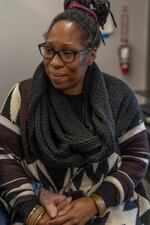
Social worker and end-of-life doula JamiQuan Rudd holds hands with an attendee of the Legacy Cafe. Rudd works with clients in Douglas County, Ore.
Justin Higginbottom / JPR
At a weekly meeting in the breakroom of a community health center in the small Oregon town of Winston, JamiQuan Rudd serves homemade soup to four older adults sitting around a big table. She calls this get-together the Legacy Cafe.
Every week Rudd chooses an icebreaker topic from a stack of cards. This time she pulls “empathy” and a quote from Jane Goodall: “The least I can do is speak out for those who cannot speak for themselves.”
“Our goal in this place is to foster empathy for one another,” says Rudd.
“And a little ridicule,” chimes in one member.
Rudd is an end-of-life doula, sometimes called a death doula, specializing in rural care. In that role she provides nonmedical support to those in their last stage of life.
It’s a more holistic service than hospice care, which usually involves medical staff providing comfort and support for those who are dying. For example, Rudd focuses more on emotional guidance through death.
“The world doesn’t want to talk about dying. In this place we talk about the privilege of death,” says Rudd.
She helps with practical things like funeral arrangements, helping someone donate their body, or planning for what happens to their property after death. She’s been helping one 83-year-old client with that recently.
“We talk about his books and his art and we share them with each other. And then we figure out what’s going to happen to [it]. Will you donate [it]? Will we put [it] on a Google Drive?” explains Rudd.
That person she’s guiding is Ben Trill. She’s also helping him with one of the biggest issues she finds in older communities, especially in rural areas — loneliness and isolation.

Ben Trill, right, at a gathering of older adults in Douglas County. Trill says he looks forward to the gatherings every week.
Justin Higginbottom / JPR
“The loneliness that comes with old age. You don’t fit in, you can’t go here, [can’t] do that. You can’t do the texting because you can’t see,” says Trill.
Trill is nearly blind and has trouble hearing. Rudd helped him get a new phone recently so he can better communicate through texting, something he’s noticed everyone is obsessed with.
Rudd’s idea for the Legacy Cafe started with Trill and the goal of helping him and other isolated older locals socialize.
“Loneliness kills us more than most diseases,” she says, “It kills more older adults than you can ever imagine.”.
Trill can feel invisible in this world, he says, ignored even in his own home he shares with extended family.
“I was desperate before I found this group,” he says.
Originally from London, Trill has a history of working in theater. He has a habit of breaking into performances like from Charles Dickens’ “A Christmas Carol.” And at the Legacy Cafe, he has a willing audience.

Social worker and end-of-life doula JamiQuan Rudd. She helps clients with practical things like funeral arrangements, helping someone donate their body, or planning for what happens to their property after death.
Justin Higginbottom / JPR
Although end-of-life doulas are gaining popularity, major challenges remain in providing the service, explains Elizabeth Johnson, executive director of The Peaceful Presence Project. Her nonprofit provides end-of-life doula training.
First, she says it’s a struggle getting the word out that this service exists. And she says the care isn’t usually covered by insurance.
“At this stage, there is no reimbursement pathway for end-of-life doula work when it comes to insurance,” says Johnson.
Her group wants to change that.
Rudd took The Peaceful Presence Project’s rural doula training course. Although she’s a full-time social worker, she uses that training with her group of older Winston residents. She says that someone would generally hire her as a doula when they have six months or less to live.
After their Legacy Cafe meeting, Rudd gives Trill a ride home, which she often does since medical transport can be unreliable in the region.
On the drive she explains that older adults face unique challenges in rural areas. The biggest obstacle is access to care.
She’s also noticed cultural barriers. Folks here tend to be self-reliant and can have trouble asking for help, even if they find themselves in poverty. Douglas County is timber country. And logging companies don’t provide the number of well-paying jobs they once did.
Rudd says that one of the biggest parts of her job, which anyone can do, is to better acknowledge our aging neighbors.
“That moment that you will take just to look them in their face will coast them through to the next time,” she says.
She’s also seen firsthand what can happen when someone isn’t willing to discuss the details of death. Her mother recently died, leaving behind boxes of things collected over a full life. She never got around to telling Rudd what to do with it all.
“I spend my week reminding this group of people that they matter. That their life’s work is just not going to disappear,” she says. “I think that’s what we all want — for someone to be able to remember our names.”